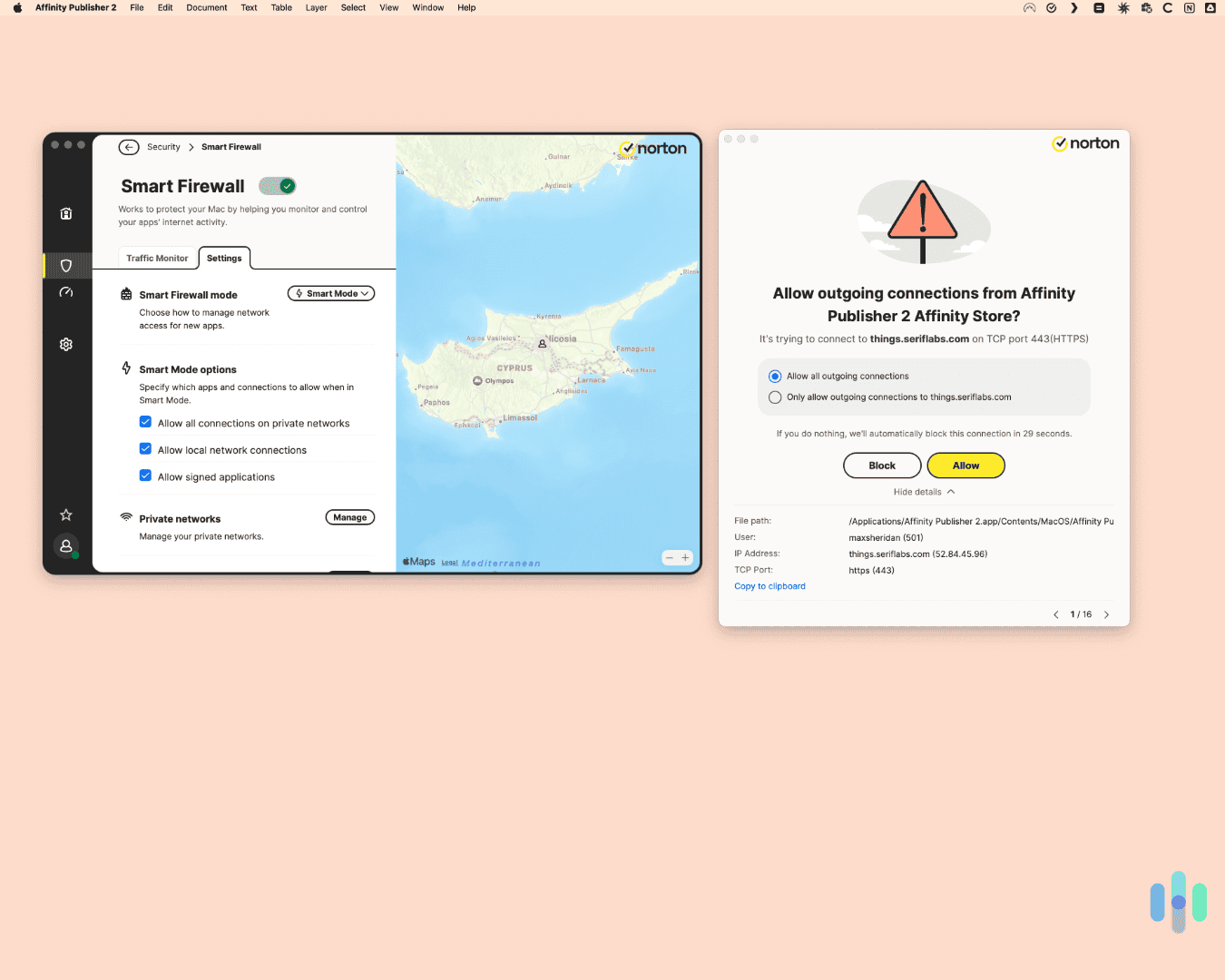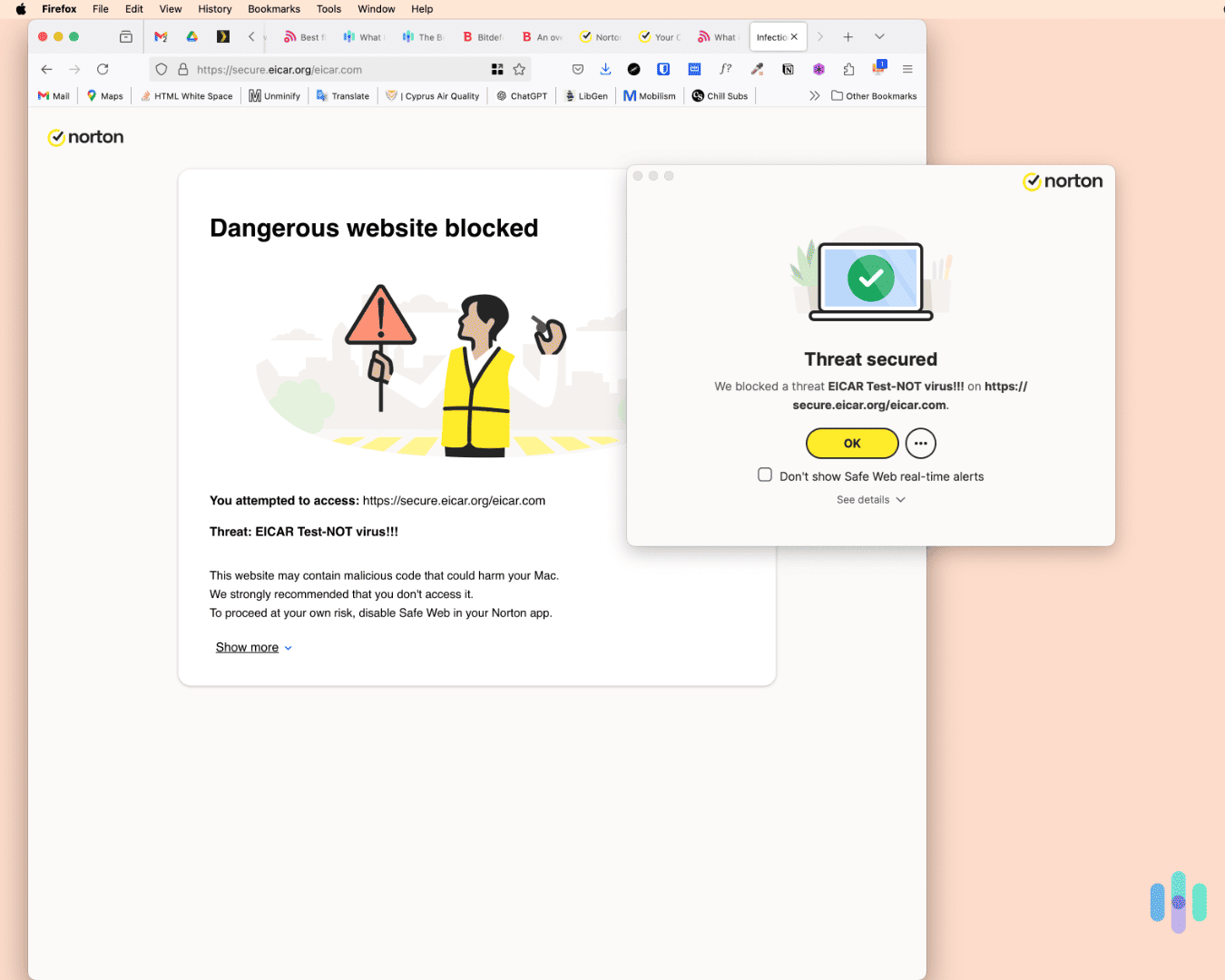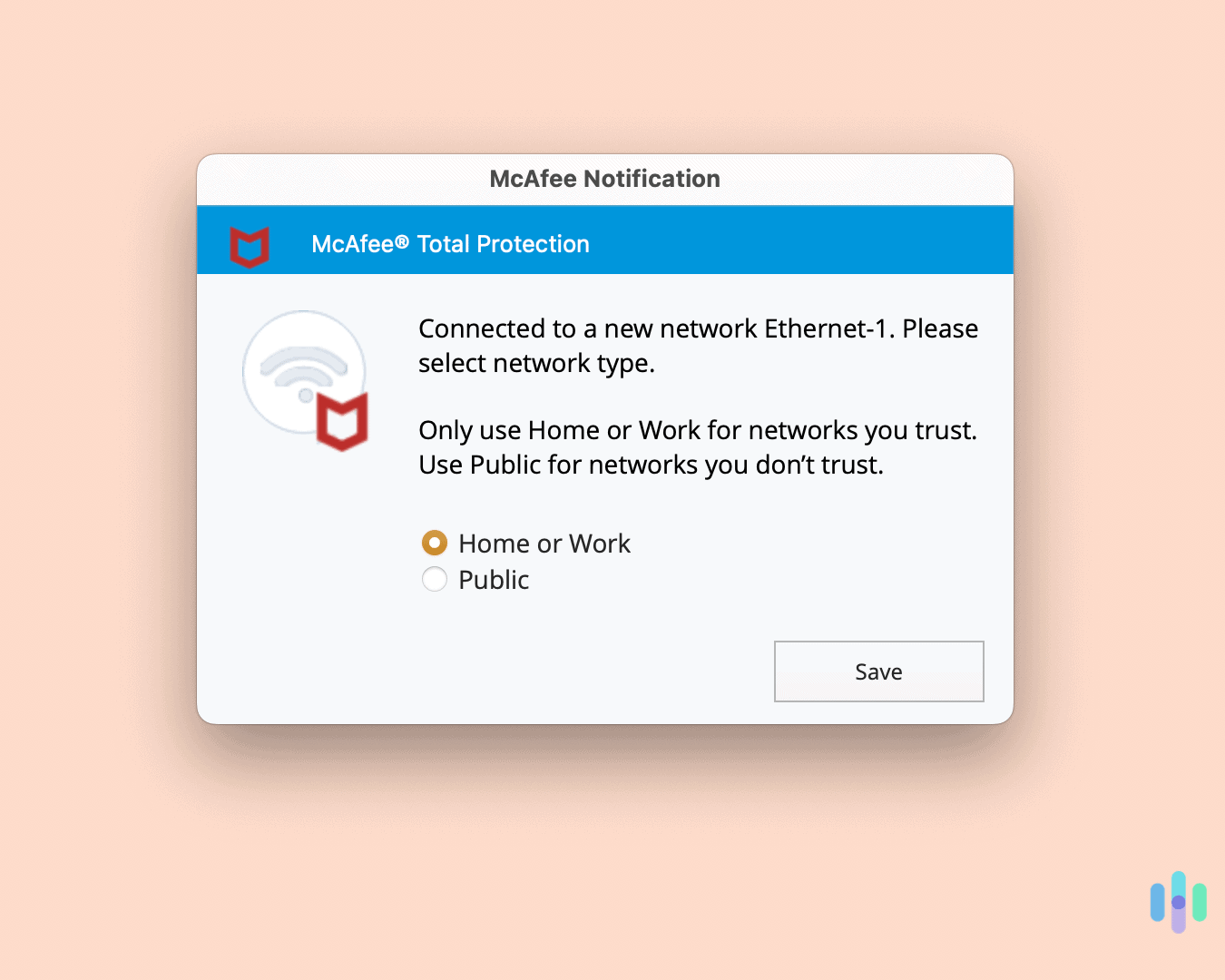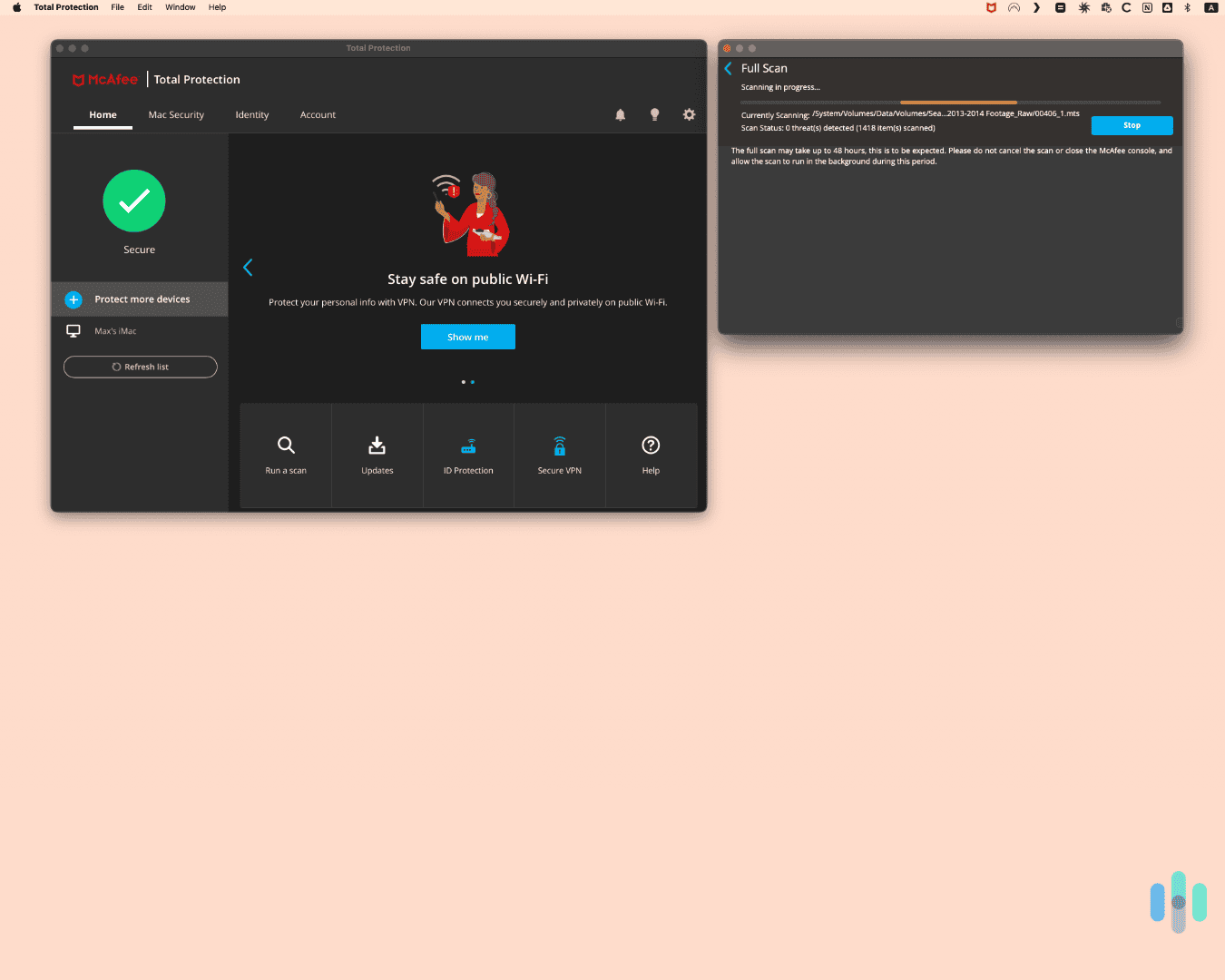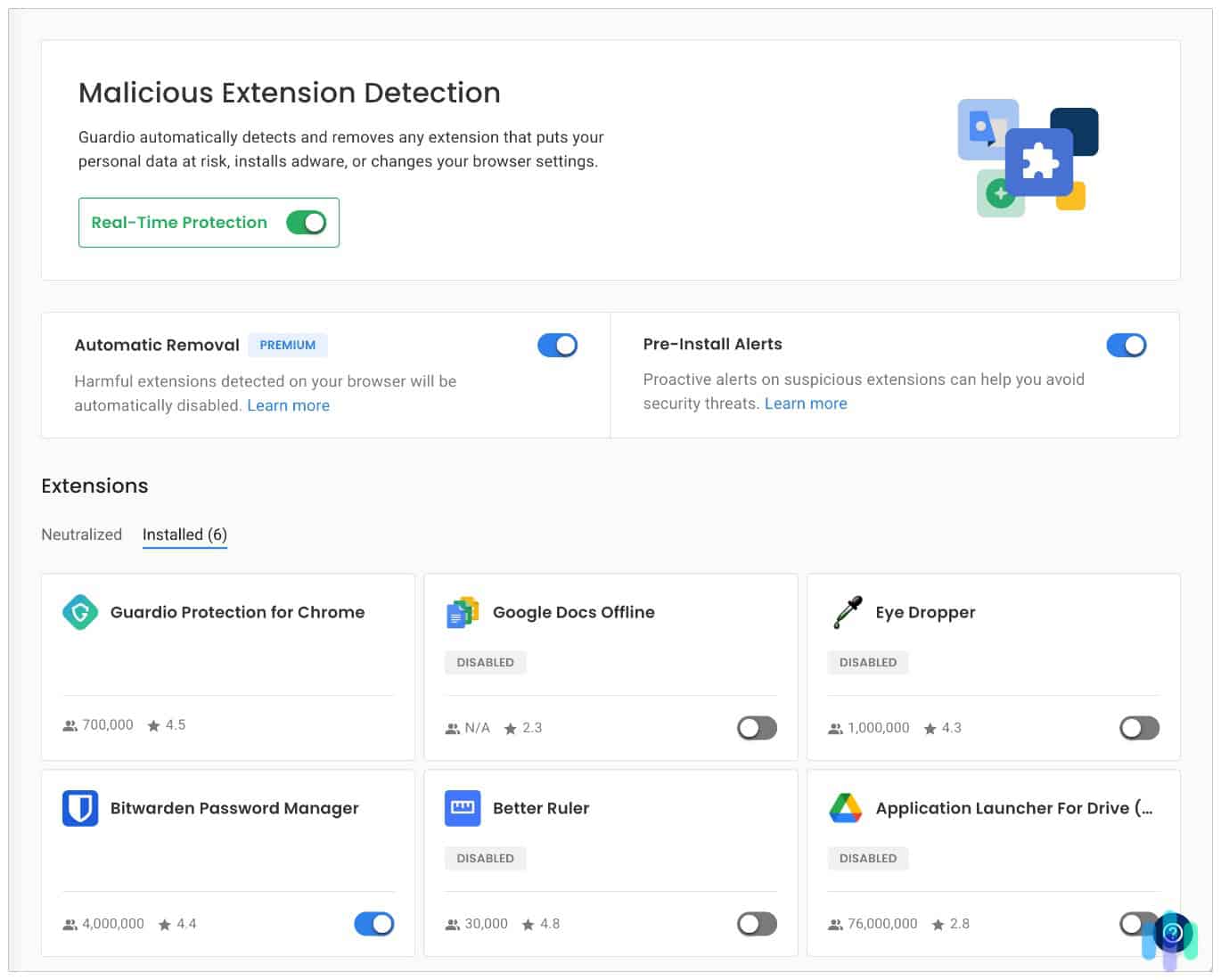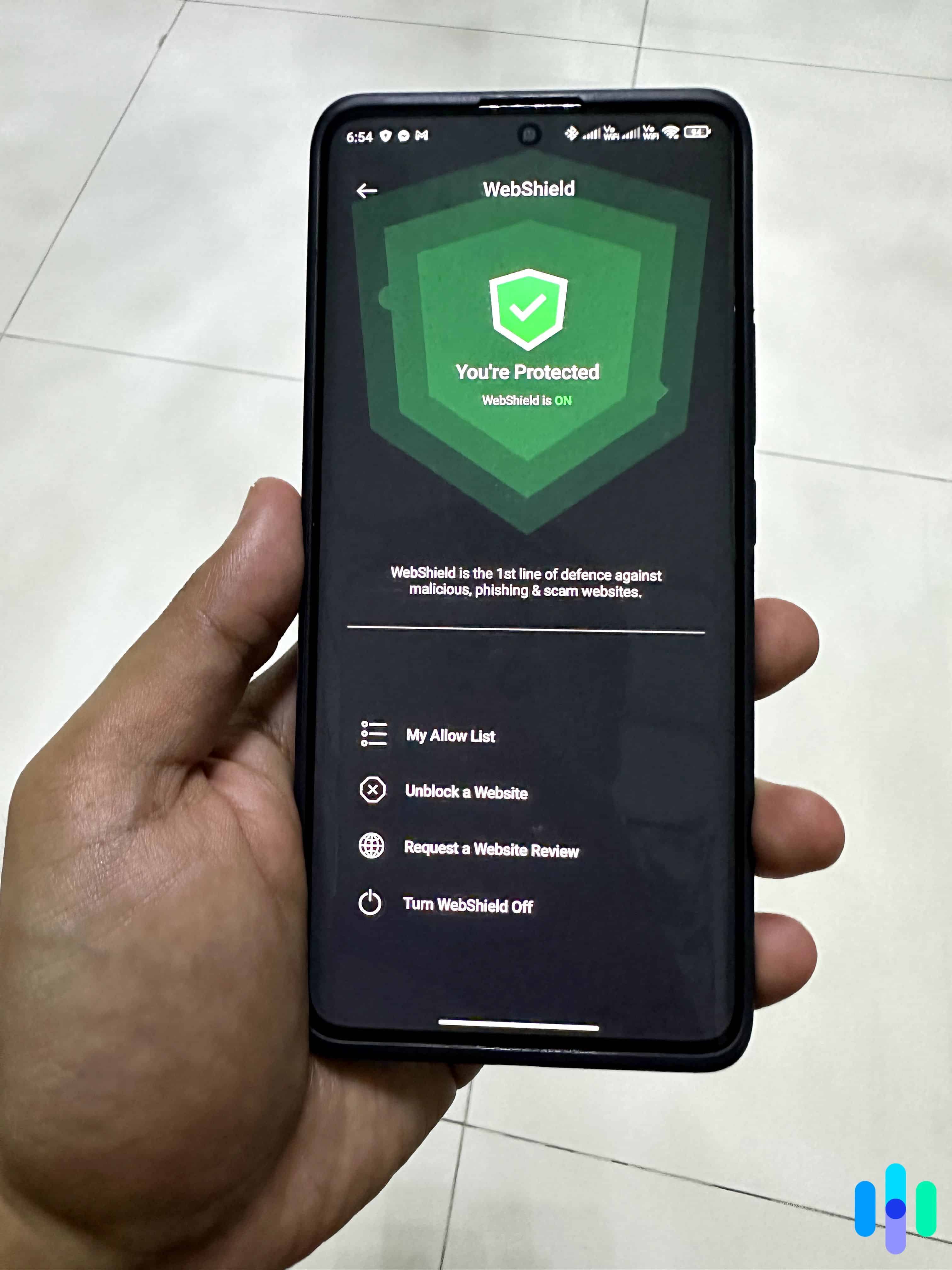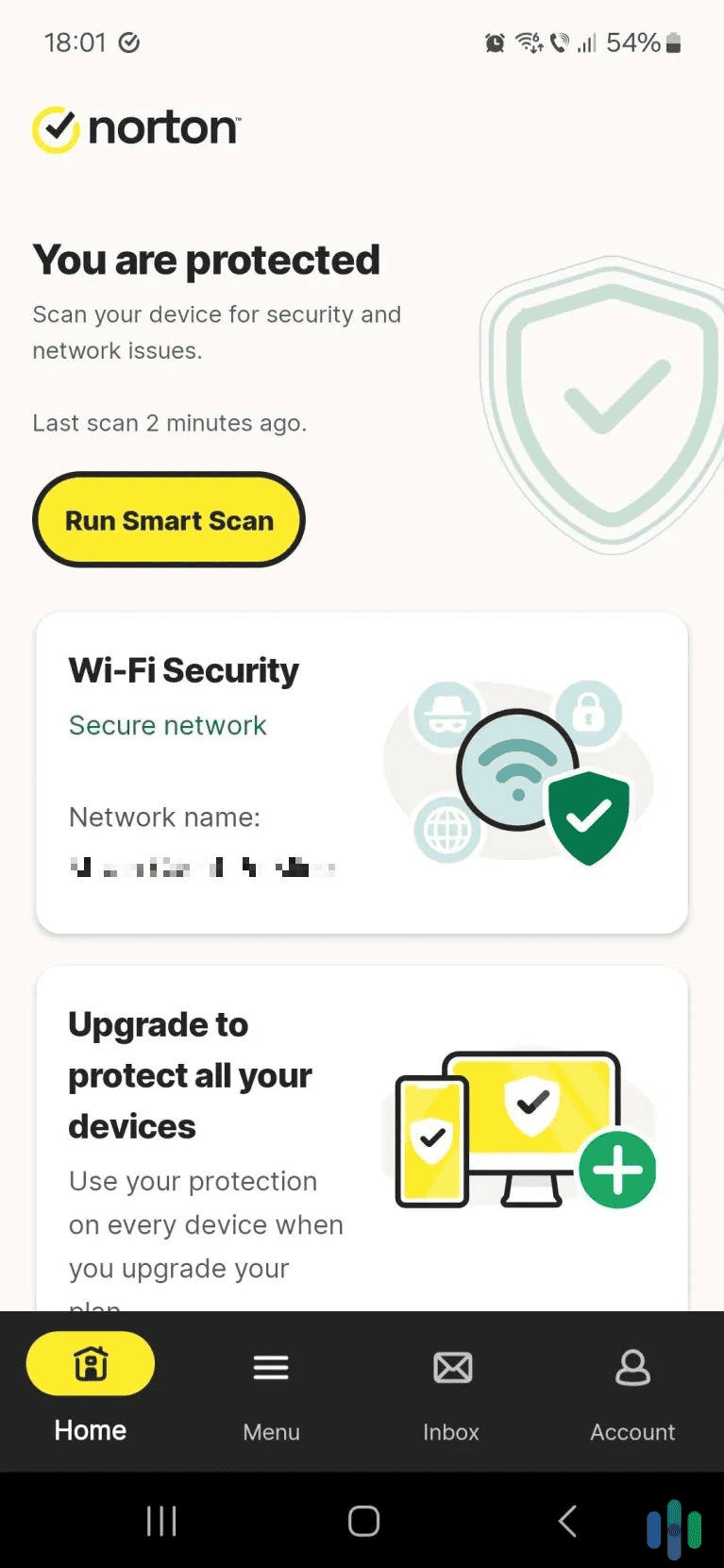The Best Firewalls of 2026
As viruses get trickier to foil, a software firewall is a must, and Norton’s Smart Firewall is perfect for the job.
Your router’s firewall is your first line of defense against data snoops and cybercriminals. It keeps an eye out for any suspicious traffic on your network — at least in theory. But router firewalls typically fall short in two key areas. They can’t spot unusual outbound traffic. Think Trojans already nestled on your laptop reaching out to mission control. And they can’t help when you’re out and about using sketchy public Wi-Fi.
To stay totally safe, we recommend adding an additional layer of security to your devices: quality antivirus software with a firewall. Here are the three antivirus firewalls that performed best in our tests. This list includes our top pick Norton. Norton’s Deluxe 360 package ($39 for the first year, and $105 thereafter) was the best option we tested for budget, ease of use, and overall security.
>> Read More: Am I Using the Right Firewall?
FYI: When we add software firewalls to our devices on our home networks, it isn’t just to protect the devices we happen to be using. A smart firewall will make sure that if one device gets infected, it won’t pass the bug on to the rest of the devices on our network.
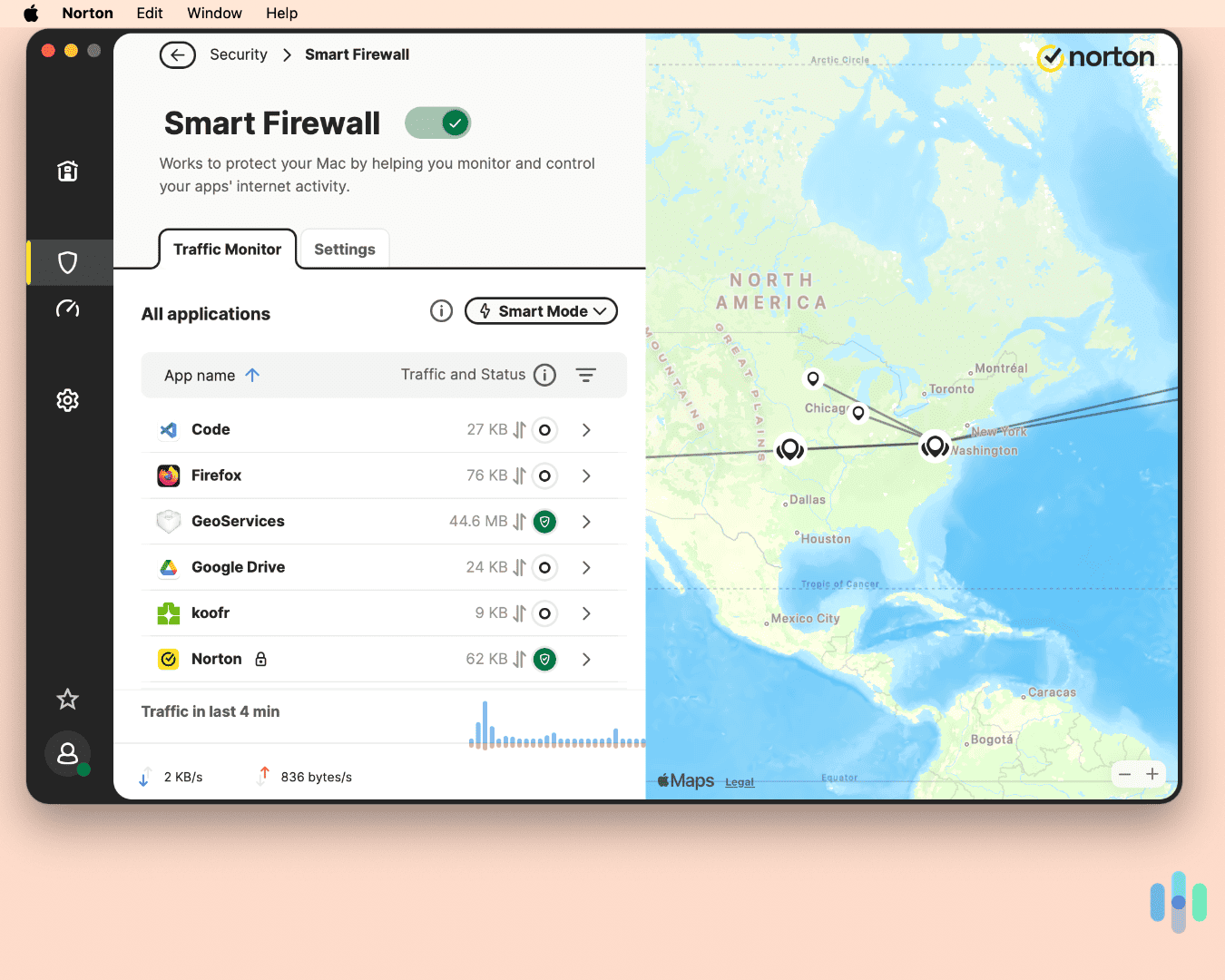
The Best Firewalls at a Glance
- Norton Antivirus - Best User Experience
- McAfee Antivirus - Best System Protection
- Bitdefender - Best for Advanced Users
Comparing the Best Firewalls Side by Side
| System |
Norton Antivirus

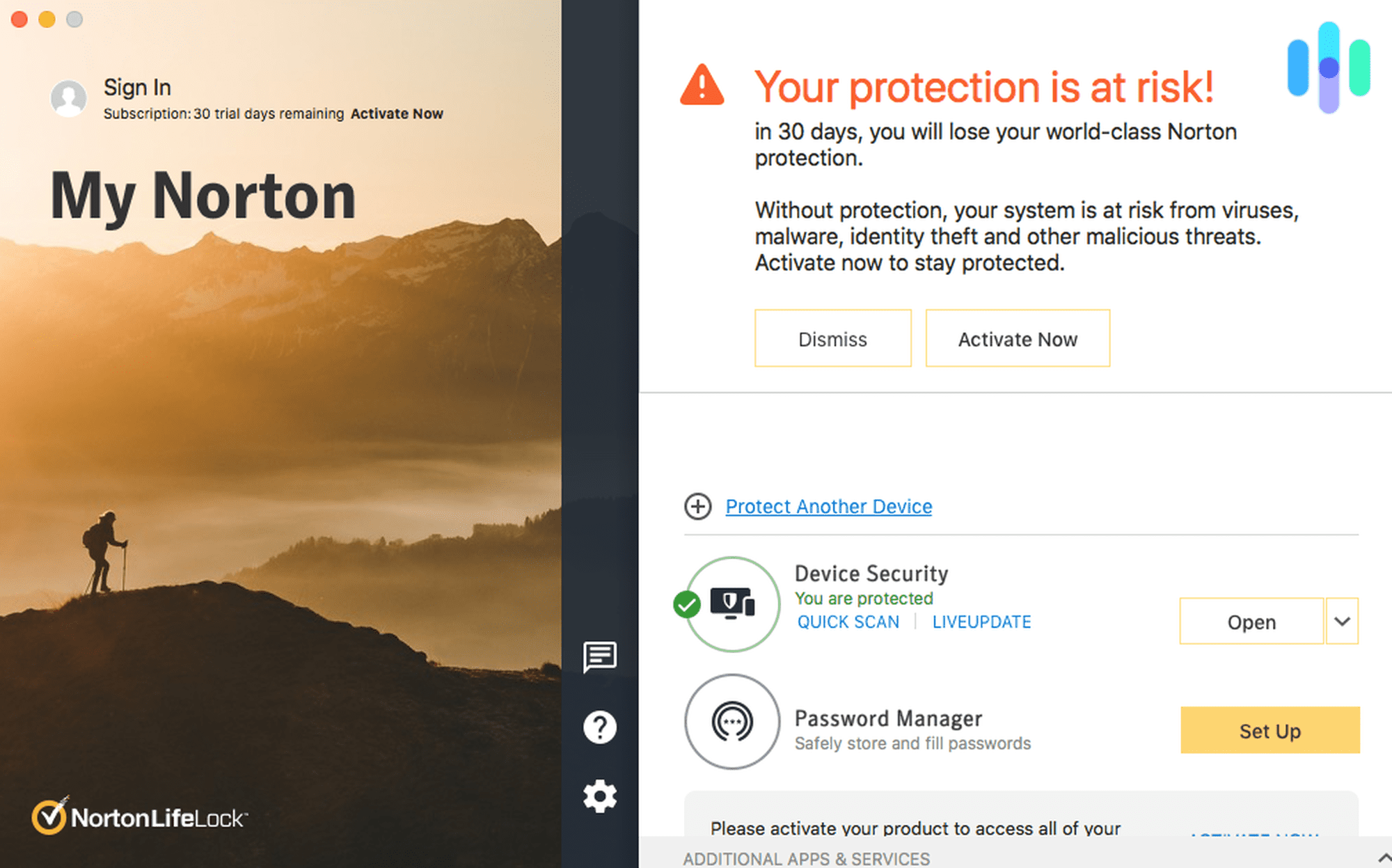
|
McAfee Antivirus

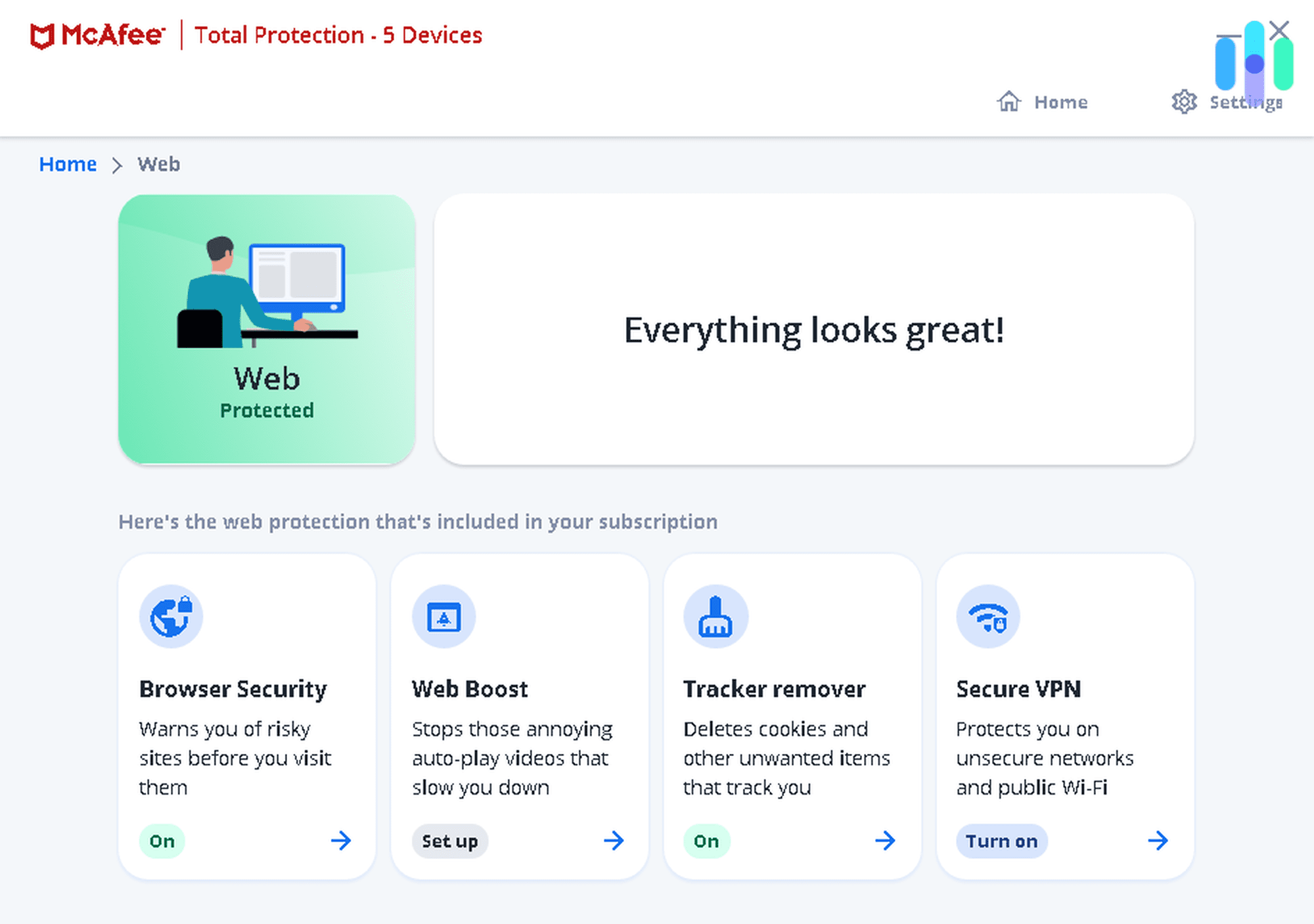
|
Bitdefender

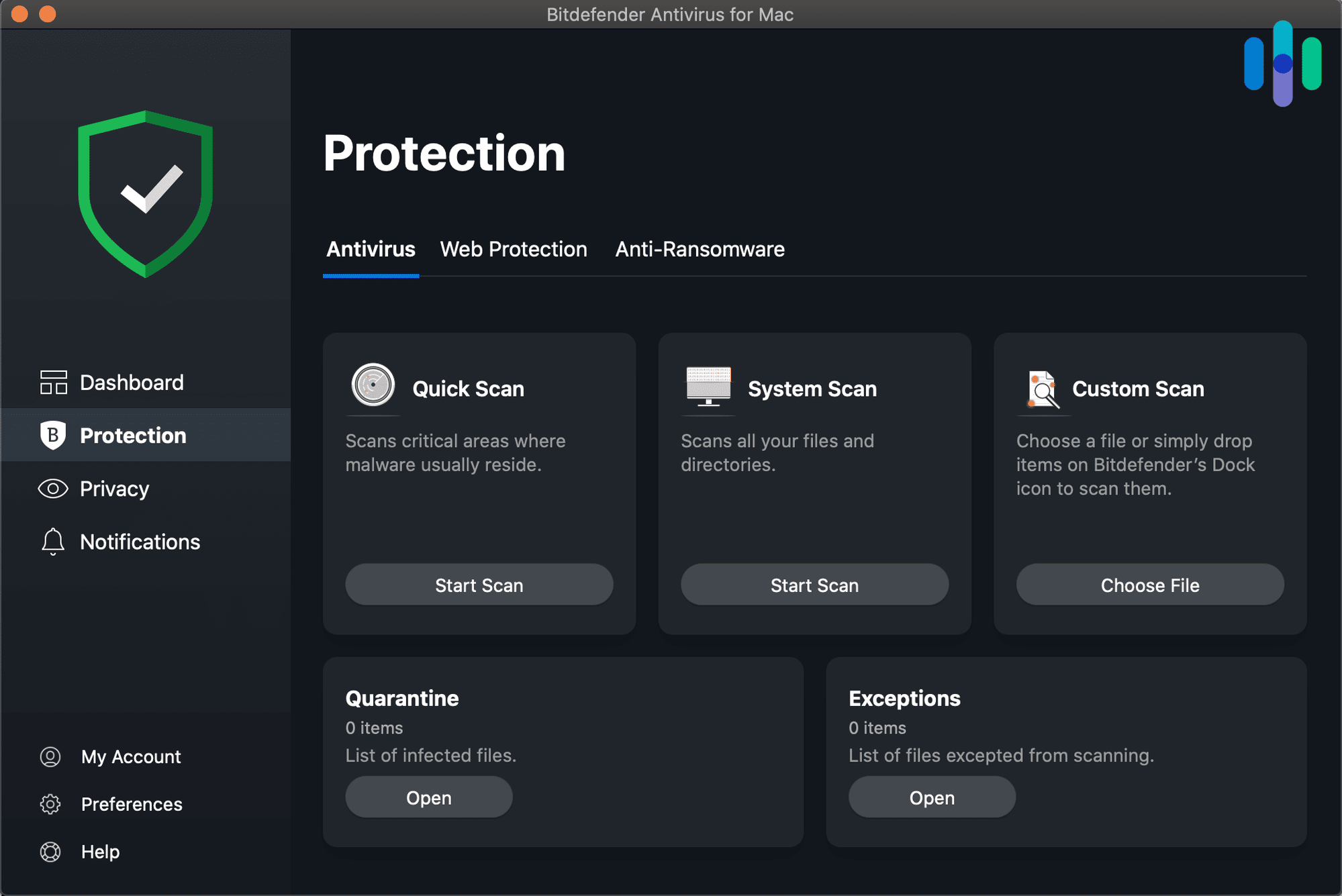
|
|---|---|---|---|
| Ranking | 1st | 2nd | 3rd |
| Ratings | 9.7/10 | 8.8/10 | 8.7/10 |
| Behavior-based detection | Yes | Yes | Yes |
| Real-time malware protection | Yes | Yes | Yes |
| Ease of use | Easy | Easy-Medium | Medium |
| Number of devices covered | 3-10 | 5-10 | 5-10 |
| Plans starting at | $39.99 | $39.99 | $49.99 |
| Firewall for Macs | Yes | Yes | No |
| Read Review | Norton Antivirus Review | McAfee Antivirus Review | Bitdefender Review |
Our Top Firewall Picks for 2026
-
1. Norton Antivirus - Best Firewall for Android Devices
View Plans Links To NortonProduct Specs
Virus Detection Yes Malware Detection Yes Firewall Yes Full, quick, and scheduled scans Yes Real-time protection Yes Behavior-based monitoring Yes Who Is Norton Best For?
Norton 360 packages with “Smart Firewall” are geared to households that want complete online security without having to tinker too much under the hood. Norton premium plans, starting at $39.99 for the first year, are also good for subscription bloat because they’re an antivirus, VPN, parental controls, and password manager rolled into one.
Did You Know: Norton also has family plans with parental controls and protection for up to 10 devices. If you’re a family of four or more, we found this option to be the best.
Pros
- Excellent dashboard design
- Robust malware protection tools
- Protection for up to 10 devices
- Reasonably priced plans
Cons
- No free plan
- No file shredder
- Buggy Chrome browser extension
Firewall Features
Norton’s “Smart Firewall” is more than just a malware dragnet. It knows implicitly how malware behaves so it can spot bad behaviors and block the source even if it hasn’t seen a specific bug before. This advanced feature is called behavior-based detection. We like to see it running in the background because not every virus we encounter is going to be on the “most wanted” list of malware databases. Some are going to be novel, under-the-radar attacks, such as zero-day exploits.
An intelligent firewall also means a smoother everyday experience because Norton can recognize benign traffic. In other words, Norton doesn’t have to ask for our approval every time our productivity app requests an outbound connection. To get this predictive protection, we just flipped on “Smart Mode” and let it do its job.
Pro Tip: To check out detailed connection data for individual apps with Norton, just click on the app in the traffic monitor tab (Security > Smart Firewall). Norton will show you, in real time, exactly where your traffic is going and how much data it’s consuming. You may be in for a shock.
Norton’s “Smart Firewall” checking an outbound request it wasn’t sure about. Malware Protection
Malware protection is Norton’s bread and butter, so we weren’t surprised to see Norton sail through our simulated virus attacks and our attempts to access scammy websites. With the latter, Norton not only flashed us warnings; it gave us detailed explanations of what types of scams to expect. Both of these features are part of Norton’s Safe Web service and both are intelligent like Norton’s firewall. They flag suspicious behavior, not just suspicious URLs or file names.
Norton offered real-time protection, which kept an eye out for malicious email attachments. In addition to that, Norton also gave us scheduled deep system scans, protection for our external drives (a nice perk), and the option to update our virus definitions on demand. This last one is usually unnecessary, but it’s good to have if a zero-day bug is on the loose.
>> Go Deeper: How to Prevent the Latest Online Scams
FYI: We had the option to exclude certain files or apps from Norton’s real-time protection. In theory, this might be useful if Norton repeatedly mislabels a safe app or process as sketchy. In practice, however, we recommend letting Norton make the calls.
Norton’s antivirus stopped a malicious file from landing on our desktop. Cost
Norton isn’t the cheapest antivirus around. Surfshark One packages, which run $2.69 per month for 27 months, take the cake there. And quality free antiviruses do exist. But Norton is far and away the most comprehensive, out-of-the-box security option we’ve tested with a firewall. Even at renewal, Norton’s 360 Deluxe option breaks down to a reasonable $8.69 per month, which is less than many quality antivirus with VPN bundles we’ve reviewed.
In terms of Norton’s options, we found their 360 Deluxe ($39 for the first year, $105 at renewal) to be the best value for money. Our subscription included a complete antivirus, VPN, password manager, parental controls, and 10 GB of secure cloud storage. For large families, however, it may make sense to go with the slightly more expensive “Premium” plan because $10 more per month ($54.99 for the first year, and $144.99 thereafter) buys you protection for up to 10 devices.
>> Learn More: Protecting Your Kids Online
Did You Know: Norton has a seven-day free trial for all their premium plans. And unlike some services we’ve used in the past, canceling with Norton was hassle-free.
-
2. McAfee Antivirus - Best System Protection
View Plans Links To McAfeeProduct Specs
Virus Detection Yes Malware Detection Yes Firewall Yes Full, quick, and scheduled scans Yes Real-time protection Yes Behavior-based monitoring Yes Who’s McAfee Best For?
McAfee’s Total Protection plans, starting at $39.99, are chock full of security features, including a pretty simple firewall with more granular control for advanced users. McAfee’s protection is aggressive. It initially firewalled our “home” network and even dredged up a potentially malicious, 2-year-old file buried deep in our library on its first scan. If that’s the kind of protection you want, McAfee has a few plans worth looking at, the more expensive “Premium” and “Advanced” options coming with security for unlimited devices.
Pros
- Real-time threat scanning
- Thorough system scans
- Advanced firewall options for experts
- 30-day trial
Cons
- Firewall interfered with internet
- System scans are on the slow side
- Clunkier user experience
FYI: When we say McAfee is thorough with its system scans, we mean it. Our first scan took over five hours. On the positive side, McAfee did identify some long-dormant potential threats for us.
Firewall Features
McAfee’s firewall is a little odd in that McAfee works as a second gatekeeper alongside Windows’ built-in firewall. McAfee protects outbound traffic, while Windows Defender protects inbound. Specifically, McAfee determines if the outbound requests originating from our devices are suspicious or not. To do this, like Norton, it uses a combination of virus definition checking and behavior monitoring. If it suspects foul play, McAfee flags the request for our approval.
As we said up top, McAfee tends to err on the side of security, which made day-to-day operations a little more hands-on than we were used to with a low-maintenance app like Norton. Likewise, two firewalls running at the same time, one on top of the other, wasn’t the best recipe for CPU efficiency. That said, with two cutting-edge firewalls monitoring our traffic, viruses are going to have to work overtime to sneak onto our PC.
>> Read More: The Best Antivirus Software for PCs
Above, McAfee’s firewall verifies my home network. Pro Tip: McAfee’s Mac firewall was a standalone feature with advanced settings that allowed us to fine-tune port connections. Perhaps that made it less of a drain on system resources, but it’s not really useful if you’re a networking novice.
Malware Protection
McAfee’s malware protection is more straightforward. Once we flipped on real-time scanning, McAfee was a more or less silent companion. While McAfee performed adequately in our in-house tests, consumer watchdog AV-Test reported a nearly flawless catch rate in their latest study.
For maximum protection, we also installed McAfee’s WebAdvisor browser extension to check for malicious sites as we browsed. Oddly, McAfee, which works in tandem with Microsoft on its firewall, doesn’t have an extension for Bing, which might be an issue for Microsoft ecosystem purists.
McAfee ran a deep system scan. Did You Know: McAfee allowed us to schedule deep system scans daily, which we recommend. We ran these at night when we weren’t around because they took a while.
Cost
McAfee’s pricing mirrored Norton’s up to a point. There’s the lower-tier $29.99 option, the “Basic,” for one device, which likely won’t be enough. Moving up, the “Essential” package for $39.99 protects five devices, so potentially a good fit for small families. Both of these plans come with a full antivirus, VPN and password manager.
While Norton has a slightly more expensive 10-device family plan for $54.99, McAfee’s unlimited-device “Premium” plan takes the elevator all the way up to the penthouse floor at $89.99. And to be clear, the prices we’ve been quoting are introductory offers. McAfee’s $90 plan will become nearly $200 at renewal. Is it worth it? It could be — if you’re also in the market for quality identity theft protection, which McAfee offers, or are a family of four or more.
>> Learn More: McAfee Identity Theft Protection Review
Pro Tip: We were happy to see that McAfee has a generous 30-day free trial. However, in our experience, turning off auto-renewal can be tricky, if not downright impossible. That would be an aspect of user experience we’d remedy right away if we were McAfee.
-
3. Bitdefender - Best for Advanced Users
 View Plans Links to Bitdefender
View Plans Links to BitdefenderProduct Specs
Virus Detection Yes Malware Detection Yes Firewall Yes Full, quick, and scheduled scans Yes Real-time protection Yes Behavior-based monitoring Yes 
Who’s Bitdefender Best For?
Bitdefender is a top-rated antivirus that performed well both in our in-house tests and in independent lab tests. Unique among the antiviruses on this list, Bitdefender also has a very good free version that gave us all its core security features. However, to unlock other useful features like the firewall, VPN, parental controls, and a bunch of advanced features, we needed to move up to a paid plan starting at $59.99 for the first year.
Pros
- Free version with core features
- Highly customizable firewall
- Performed well in tests
- Advanced ransomware protection
Cons
- No firewall for Macs
- May be confusing for beginners
- Pricier if you want unlimited VPN
Mac Alert: When we tested Bitdefender for Mac, we didn’t find a firewall. That was no accident. There is no firewall for Macs, so if you’re looking for a total security solution for your new M3, we recommend sticking with our first choice, Norton. You should also check out our top-recommended antivirus software for Macs.
Firewall Features
Bitdefender’s firewall has considerably more going on under the hood than Norton or McAfee. For most users, enabling Bitdefender’s dynamic network adapter when connecting to a new network and flipping on stealth mode when accessing public Wi-Fi will be enough tinkering. The first lets Bitdefender judge if a particular network needs more stringent or lax protections. The second hides your IP address from public network scans. Otherwise, unless setting up DHCP servers is what you do in your free time, we recommend leaving the firewall alone.
>> Go Deeper: What Hackers Can Do with Your IP Address
Bitdefender mission control for Mac: No firewall included.
Pro Tip: If you want to scrutinize all the traffic coming and going from your device, Bitdefender lets you. Under advanced settings, toggle on “Alert Mode.” Just be prepared for a lot of alerts.
Malware Protection
Bitdefender’s firewall worked in tandem with a few other overlapping antivirus features to keep our devices free of bugs. “Advanced Threat Defense,” for example, kept an eye out for suspicious app behaviors, while “Online Threat Prevention” monitored our network traffic.
Bitdefender’s premium subscriptions also protect against phishing, cryptomining, and ransomware. Bitdefender’s “Ransomware Remediation” tool is particularly sophisticated in that if it suspects suspicious activity on your device, it will kick in and back up critical files for safekeeping until the threat is resolved. And that isn’t the end of Bitdefender’s security protections.
FYI: Bitdefender’s “Safepay” feature added an extra layer of security to our online payments. Instead of entering sensitive data into our browser, we had a private browser and keyboard to type in credit card details to protect against spyware and keyloggers. That’s what we call security.
Cost
Bitdefender has plenty of plans floating around, starting with a capable but stripped-down free antivirus. Their most expensive plan, the $89.99 “Ultimate Security,” comes with ID protection. We found the best value in Bitdefender’s middle tier plans — “Total Security” ($59.99 for the first year, and $99 thereafter) and “Premium Security” ($79.99 for the first year, and $259.99 thereafter) — though both are more expensive than comparable Norton and McAfee plans. And only the $79.99 “Premium Security” plan comes with an unlimited VPN.
In Bitdefender’s defense, if all you need is a basic antivirus, they do offer a solid free plan. And Bitdefender’s beefier packages offer more protection than any of the other plans on this list.
Family Special: For families with tons of devices, there’s always the Bitdefender “Family Plan” for $69.99. It protects 15 devices and comes with a full AV and parental controls. However, the VPN is, again, limited to a scrawny 200 MB per day.
Methodology: How We Test Firewalls
Firewalls and antivirus technology are among the products we test that are most complex and most critical to our digital safety. To make the right recommendations, our experts tested nearly a dozen options on our personal computers to see which ones offer the most useful firewall features.
Our tests lasted over a month, during which we looked for these three factors crucial to choosing the best antivirus software with a firewall:
- Malware protection: Detecting malware at the firewall level is crucial in keeping not only your devices but also your entire network safe. We looked for options offering behavior-based detection rather than firewalls that only look for strains of malicious code it reads off a list.
- User experience: While functionality is important, the user-experience is, too. We looked for antiviruses with firewalls that also offer an intuitive dashboard and customizable settings you can tailor to your needs.
- Budget: Lastly, we looked for options that won’t break the bank. Antiviruses with firewalls aren’t exactly the cheapest, but that doesn’t mean you need to spend hundreds of dollars on them every year. Our top recommendations have introductory prices ranging from $39 to $89 in the first year, but they often include extras, such as VPNs.
FYI: We’ve been throwing around virtual private networks (VPNs) a lot because a number of top antivirus services now include them in their security packages. Not sure what this critical piece of online protection does? Check out our newly updated VPN buyer’s guide for a quick overview.
Is My Device’s Built-In Firewall Enough?
This is really two questions. Is my router’s firewall enough? And is my laptop’s firewall enough?
To answer the first question, the firewall your router provides may be good at blocking inbound traffic. But if you get infected via a phishing scam, to name one very common case, and the virus takes control over your laptop and then breaches the firewall in the other direction, neither you nor your firewall would know. And there are hundreds of other cases where a router-based firewall wouldn’t stand up.
Moving on to the second question, some of our devices do come with firewalls. Both Windows machines and Macs have them, but like your router, they only handle inbound connections. So, again, you’d be fair game for any bad program that happened to worm its way onto your device (including actual computer worms). A quality firewall with an antivirus component, on the other hand, would a) detect a rogue application meddling with your system, and b) pick out any suspicious outbound requests it sent.
Did You Know: Androids and iPhones don’t have a firewall, primarily because mobile devices don’t field incoming connections from other devices like laptops and desktops do.
>> Read More: Can My iPhone by Hacked?
Does All Antivirus Software Come with a Firewall?
Many services do, but not all. Free versions of Bitdefender and Avira don’t have firewalls, for instance. Malwarebytes is another top-rated antivirus without a firewall. Here’s our complete Malwarebytes review. Even some of the top antivirus software, such as TotalAV and Surfshark Antivirus, lack this crucial feature.
Antiviruses without firewalls aren’t necessarily inferior. These AVs rely on similar behavior-based detection and cloud scanning to protect our devices, but instead of monitoring network connections, they’re constantly scanning devices for abnormal activity.
FYI: One way to distinguish a firewall from a pure antivirus is that while the firewall only works with an internet connection, an antivirus can protect your devices without one.
What Features Should My Firewall Have?
No matter which antivirus you choose, your firewall should have behavior-based virus detection. If your AV has a smart firewall like Norton, your firewall isn’t just looking for code identified as malicious — it’s looking for patterns of activity that aren’t right. Like if an app you’ve downloaded starts communicating with suspicious IP addresses via a port you don’t typically use.
We also like firewalls with traffic monitors. That way, we can view the requests our apps are making in real time, and also have a record of the connections we’ve blocked or approved in the past.
Finally, we like to have at least some control over the aggressiveness of our firewall. Most of the time, we’ll let the firewall call the shots, but there are cases when hand-blocking apps or processes might be necessary. If you’ve ever tried, unsuccessfully, to stop an app from auto-updating, you know exactly what we mean.
Pro Tip: If you download a new program you’re not sure about, a firewall traffic monitor is a great way to vet it. Just check out the firewall logs. If you notice your new software is making a bunch of outbound connections to domains like adtracker.com, you’ll know you’re being data mined.
Summing Up
Software firewalls are probably the last things we think about when fencing our devices from intruders. After all, we’ve got our VPNs, our antivirus, our ad blockers, etc. And most of us have a native firewall built into our routers and laptops anyway. So why the extra level of security? Simple: outbound connections. In combination with our AV, a firewall can block suspicious requests. Your native firewall can’t.
For ease of use, price and security, Norton’s “Smart Firewall” wins hands down. For less than nine bucks per month at renewal, you can protect five devices with a VPN, parental controls, and 50 GB of storage thrown in. Plus, you can be on a Windows device or Mac, Android or iOS.
If you like a little more control, and a more aggressive approach, we recommend checking out McAfee. Costs for mid-tier plans are about the same. Last but not least, Bitdefender is an excellent choice for more advanced users seeking maximum protection. Just make sure you’ve got a PC first; Bitdefender doesn’t have a firewall for Macs.
Frequently Asked Questions
-
Which firewall do you recommend?
Our top pick for overall protection, user experience, and price is Norton 360 Deluxe.
-
How much do I need to pay for a firewall?
If you purchase any of the antiviruses on this list, a firewall is included at no extra cost.
-
I have a Mac. Do I need a firewall?
Yes! Ideally you need two: your built-in firewall (for inbound monitoring) and a second firewall for monitoring outbound connections.
-
Are free antivirus programs with firewalls safe?
Well, actually, while you can find free AVs, most of them don’t come with firewalls. You’d need to upgrade for that. But the free antivirus services we cited in this article are safe to use.
-
Can firewalls be breached?
Yep. There’s really no system a determined hacker can’t breach. But adding an antivirus with a firewall to your devices makes it much more unlikely that they’d a) get on your device, or b) do any real damage if they managed.
-
The Wall Street Journal. (2017). Russia Has Turned Kaspersky Software Into Tool for Spying.
wsj.com/articles/russian-hackers-scanned-networks-world-wide-for-secret-u-s-data-1507743874 -
Reuters. (2017). Trump signs into law U.S. government ban on Kaspersky Lab software.
reuters.com/article/us-usa-cyber-kaspersky/trump-signs-into-law-u-s-government-ban-on-kaspersky-lab-software-idUSKBN1E62V4


